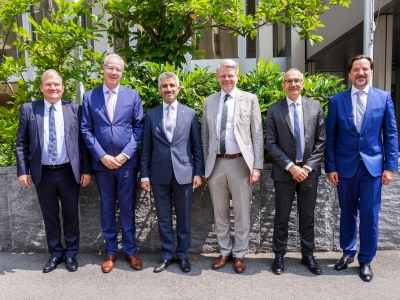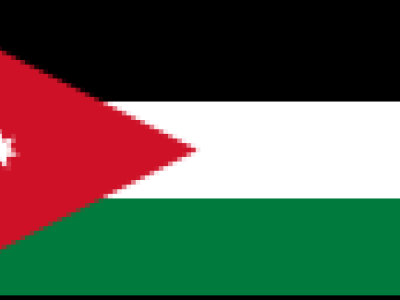About
The EFTA States signed a Free Trade Agreement with Jordan in Vaduz, Liechtenstein, on 21 June 2001. The Agreement entered into force on 1 September 2002.
Key facts
- Population
11,285,870
- GDP
$ 48,653.38 M
- Date of Signature of the Agreement
21.06.2001
- Date of Entry Into Force
01.09.2002
- Imports to EFTA States
EUR 57 M
- Exports from EFTA States
EUR 293 M
Information about agreement
Summary
The Free Trade Agreement covers trade in industrial products as well as fish and marine products and processed agricultural products. In addition, bilateral agricultural agreements between the individual EFTA countries and Jordan have been concluded which form part of the instruments creating the free trade area.
Among the objectives of the Agreement (Article 1) are to promote, through the expansion of reciprocal trade, the harmonious development of economic relations between the Parties. By 2014, virtually all customs duties on trade in industrial goods and fish and other marine products have been eliminated. The Agreement includes provisions relating to the elimination of customs duties and other trade barriers as well as other trade-related disciplines such as rules of competition, protection of intellectual property, public procurement, state monopolies, state aid, and payments and transfers. Under the Agreement, a Joint Committee is established which supervises the implementation of the Agreement.
Content of the Free Trade Agreement
The Agreement consists of 41 Articles, 7 Annexes, 4 Protocols and one Record of Understanding. The Agreement covers the following main subjects:
- Trade in Goods
- Rules of Origin
- Sanitary and Phytosanitary Measures (SPS)
- Technical Barriers to Trade (TBT)
- Trade Remedies
- Protection of Intellectual Property (IPR)
- Government Procurement
- Competition
- Institutional Provisions
- Dispute Settlement
Trade in Goods
Industrial Goods
The Agreement provides for effective market access for industrial goods in terms of tariffs and rules of origin, creating EFTA and EU parity for EFTA exports to Jordan. By 2014 (12 years after entry into force), all industrial goods originating in the EFTA States enjoy duty free access into Jordan (Article 5 and Annex III).
Fish and marine products
The Agreement covers trade in all fish and other marine products (Annex II). The EFTA States grant duty free access on imports of all Jordanian fish products as of entry into force of the Agreement. By 2005 (3 years after entry into force), the remaining Jordanian tariffs on certain fish products have been brought down to zero.
Agricultural products
Trade in processed agricultural products is covered in a Protocol under the main Agreement (Protocol A). The Protocol grants concessions for products such as sugar confectionary, pasta, prepared foods, sauces and preparations, soups, waters etc.
Trade in basic agricultural products is covered in three bilateral agricultural agreements negotiated between the respective EFTA State (Iceland, Norway and Switzerland/Liechtenstein) and Jordan. These agreements form part of the instruments establishing the free trade area.
They provide for substantial concessions on both sides, while taking into account the respective sensitivities. Each agreement contains specific rules of origin, generally based on the “wholly-obtained” criteria.
Rules of Origin
The rules of origin for industrial goods (Protocol B) concerning the definition of the concept of originating products and the methods for administrative cooperation, are based on the European layout, maintaining the general structure and the substance of the European standard rules. The specific list rules
(Annex II to Protocol B) are also based on the current pan-European model.
Sanitary and Phytosanitary Measures (SPS)
The Parties agree to apply their regulations in sanitary and phytosanitary matters in a non-discriminatory fashion and not apply any new measures that have the effect of unduly obstructing trade.
Technical Barriers to Trade (TBT)
The Parties agree to co-operate in the field of technical regulations, standards and conformity assessment, and to consult in the Joint Committee in case a Party considers that another Party has taken measures which are likely to create, or have created, a technical obstacle to trade as defined in the relevant WTO Agreement.
Trade Remedies
The Agreement contains provisions on subsidies and antidumping which are in line with the respective WTO rules, as well as procedures for the application of safeguard measures.
Protection of Intellectual Property (IPR)
The provisions on protection of intellectual property rights (Article 17 and Annex VI) covers, inter alia, patents, trademarks and copyright and geographical indications.
The level of protection in certain areas goes beyond what is stipulated under the WTO Agreement on Trade Related aspects of Intellectual Property, taking into account the principles of most favoured nation treatment and of national treatment.
Government Procurement
The Article on public procurement (Article 16) contains a review clause with a view to further liberalise public procurement markets on the basis of non-discrimination and reciprocity.
Competition
The Parties recognise that anti-competitive behaviour by undertakings are incompatible with the proper functioning of the Agreement in so far as they may affect trade between the Parties.
Institutional Provisions
A Joint Committee comprising the EFTA States and Jordan supervises the implementation of the Agreement (Articles 29 and 30).
Dispute Settlement
Consultations are the fundamental mechanism of dispute settlement between the Parties. The Agreement implies that the Parties are to endeavour to solve any differences between them on the interpretation and application of the agreement by direct consultations, and, if need be, through consultations in the Joint Committee. For cases where the consultations do not lead to a satisfactory solution, the Parties may revert to arbitration (Article 31). Annex VII governs the constitution and functioning of the tribunal.
Free Trade Agreement
Annexes and Record of Understanding
Annexes, Protocols and Record of Understanding
PAPs notifications
Bilateral Agreements on Agriculture
Agricultural Agreements
| Iceland-Jordan |
| Norway-Jordan |
| Switzerland-Jordan - English / French / German / Italian |
Joint Committee Decisions
| Decision | Subject | Adopted | Entry into force |
|---|---|---|---|
| 2025 | |||
| No. 1/2025 | Amendment to Protocol B | 10.06.2025 | pending |
| 2012 | |||
| No. 3/2012 | Amendment to Protocol B | 20.04.2012 | 01.10.2013 |
| No. 2/2012 | Amendment to Annex III | 20.04.2012 | 01.10.2013 |
| No. 1/2012 | Amendment to Annex II | 20.04.2012 | 01.10.2013 |
| 2006 | |||
| No. 1/2006 | Amendment to Protocol B | 16.08.2006 | 01.10.2006 |
| 2004 | |||
| No. 4/2004 | Amendment to Protocol A | 26.02.2004 | 26.02.2004 |
| No. 3/2004 | Annex II | 26.02.2004 | 26.02.2004 |
| No. 2/2004 | Establishment of a Sub-Committee on Customs and Origin Matters | 26.02.2004 | 26.02.2004 |
| No. 1/2004 | Rules of Procedure of the Joint Committee | 26.02.2004 | 26.02.2004 |
Joint Declaration on Cooperation
Statistics
For EFTA-Jordan trade statistics, see EFTA Trade Statistics Tool


